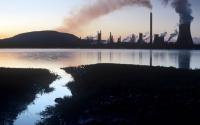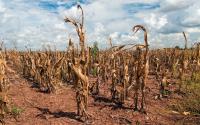13 May 2007The Independent
Florida, the US state that is most vulnerable to global warming, is belatedly joining the fight to control climate change as more than 220 wildfires - fanned by the first named storm of the season - rage across its territory.
In an embarrassing blow to President Bush, the state's new Republican Governor, Charlie Crist, announced last week "the first steps towards addressing the impact of climate change" by joining 30 other states in setting up an organisation to monitor greenhouse gas emissions.
Florida is the third most polluting US state after Texas and California; if it were a nation, it would be among the top 30 emitters in the world. Yet as a low-lying peninsula, dangling into the hurricane zone, it is particularly at risk from the consequences.
The Governor - dubbed "chain-gang Charlie" for his proposals for harsh treatment for state prisoners earlier in his career - pointedly signalled a sharp break from the attitude of his predecessor, the President's own brother. And he is scathing of the way Jeb Bush ignored the issue, even though he served as his attorney-general.
He says he is "persuaded that global climate change is one of the most important issues that we will face this century" and "a challenge that we ignore at our own peril". He added: "With almost 1,200 miles of coastline and the majority of our citizens living near that coastline, Florida is more vulnerable to rising ocean levels and violent weather patterns than any other state. Yet we have done little to understand and address the root causes of this problem, or, frankly, even acknowledge that the problem exists."
Governor Crist has now pledged to "place our state at the forefront of a growing worldwide movement to reduce greenhouse gases", and plans to hold an environment summit this summer to work out a state strategy for tackling the issue. He runs a car fuelled by ethanol, is putting solar panels on the governor's mansion, and says he wants the "sunshine state" to be the national leader in producing renewable energy.
Environmentalists say his announcement is not before time, as Florida is already suffering three weeks before the hurricane season formally opens. Subtropical storm Andrea, which formed off the coasts of Florida and Georgia, proved something of a damp squib, petering out on Thursday without making landfall. But winds surrounding it fanned wildfires that have so far charred nearly 300 square miles of the two states, made tinder-dry by a long drought.
Other huge fires have hit California and Minnesota, while record floods in Missouri are expected to peak over the weekend.
Hurricane forecasters are predicting a "very active" season this year. They expect up to 17 named tropical storms and hurricanes in the Atlantic.






